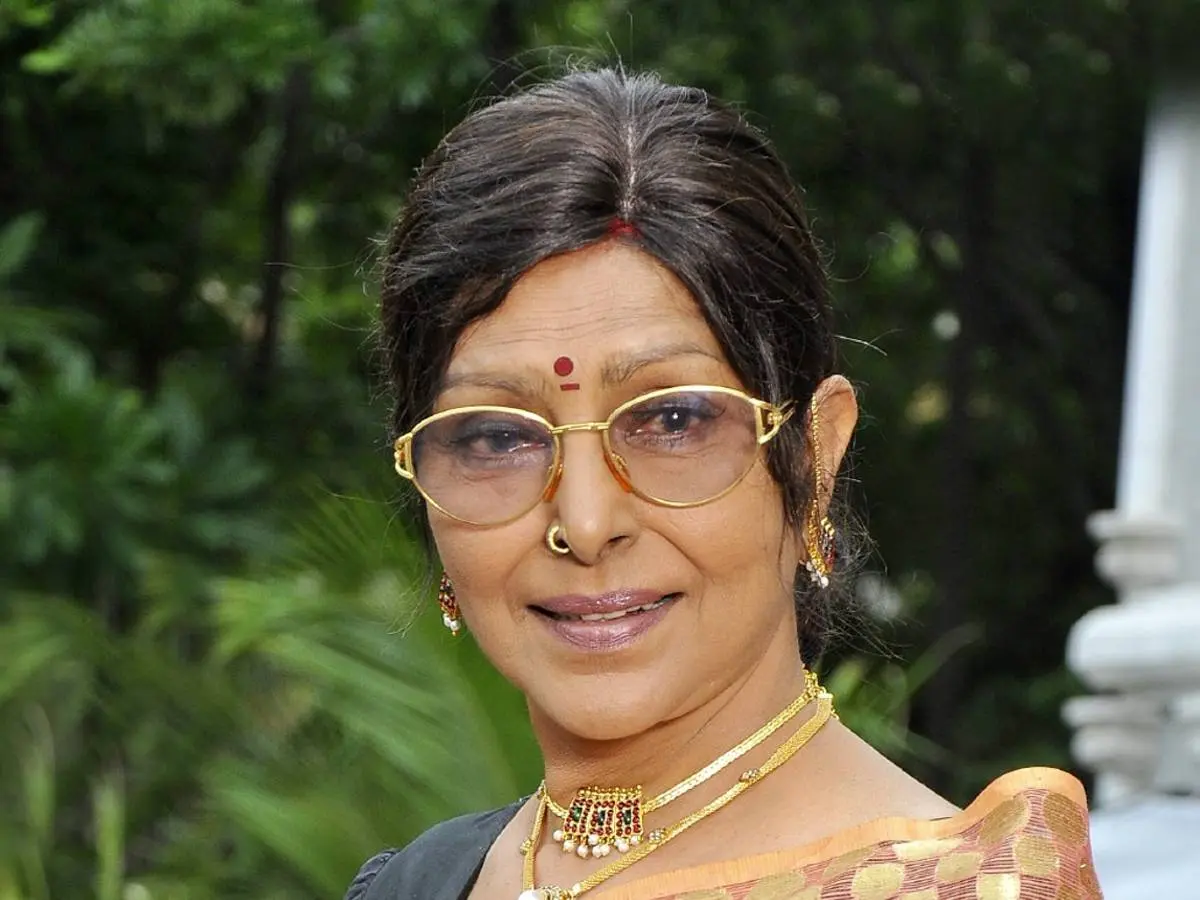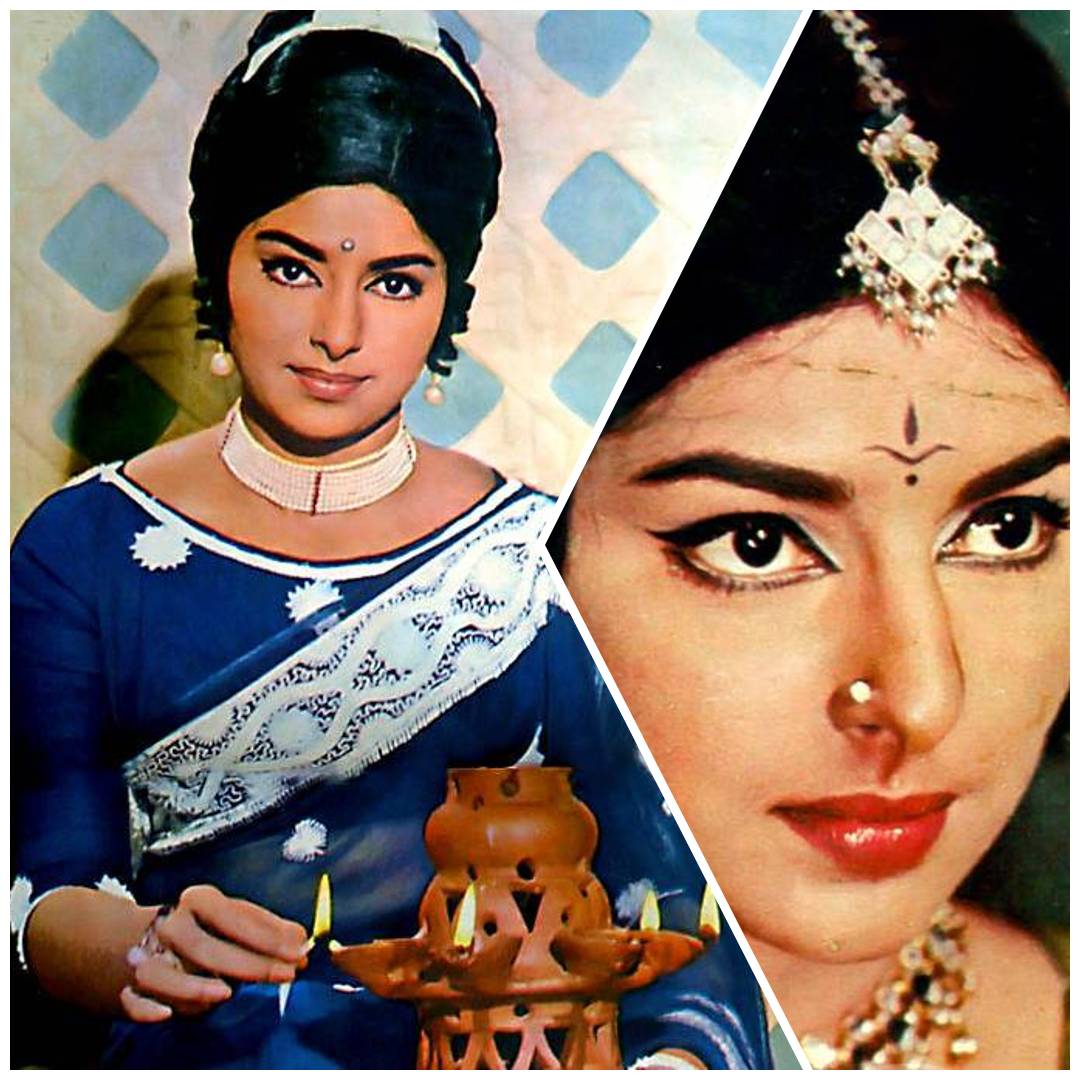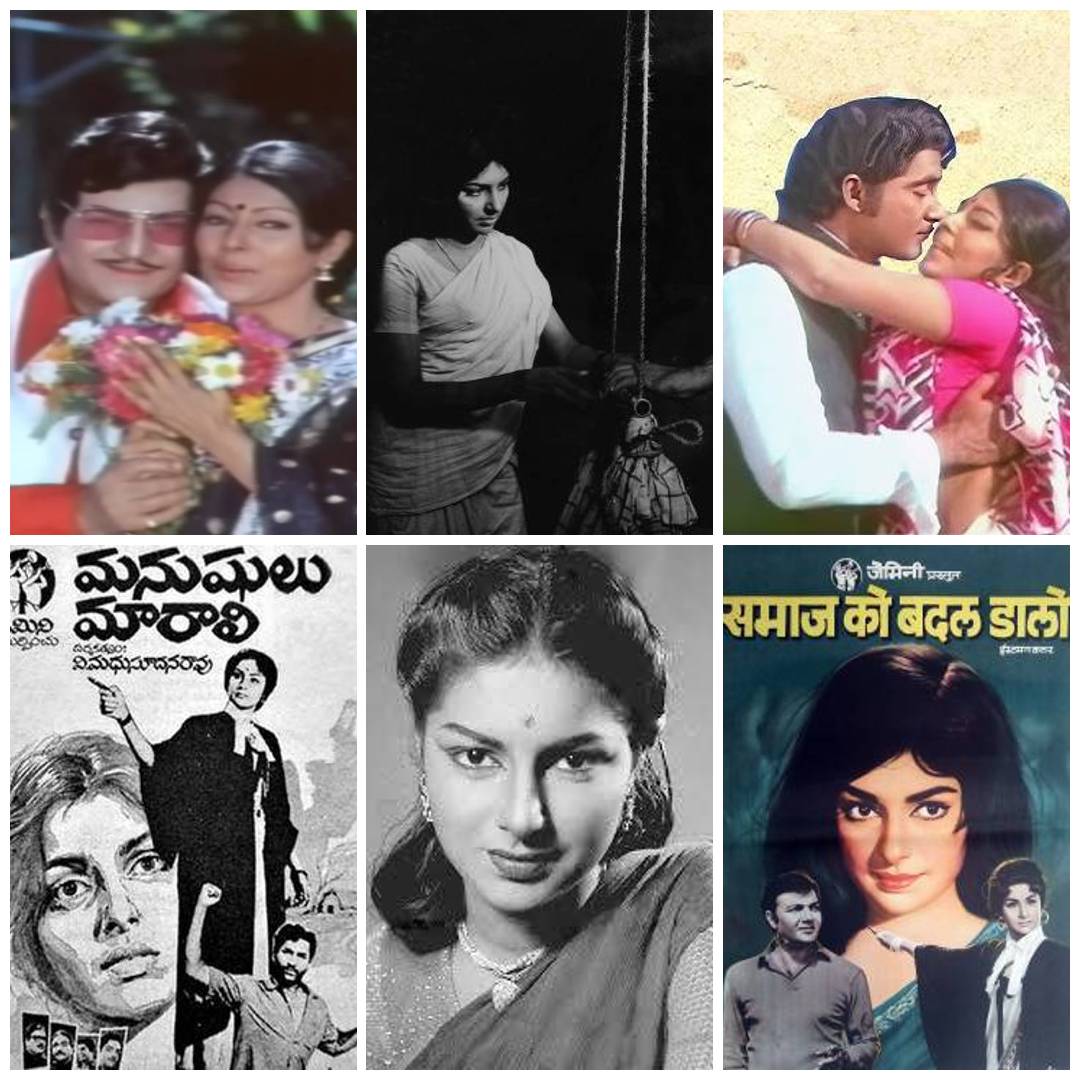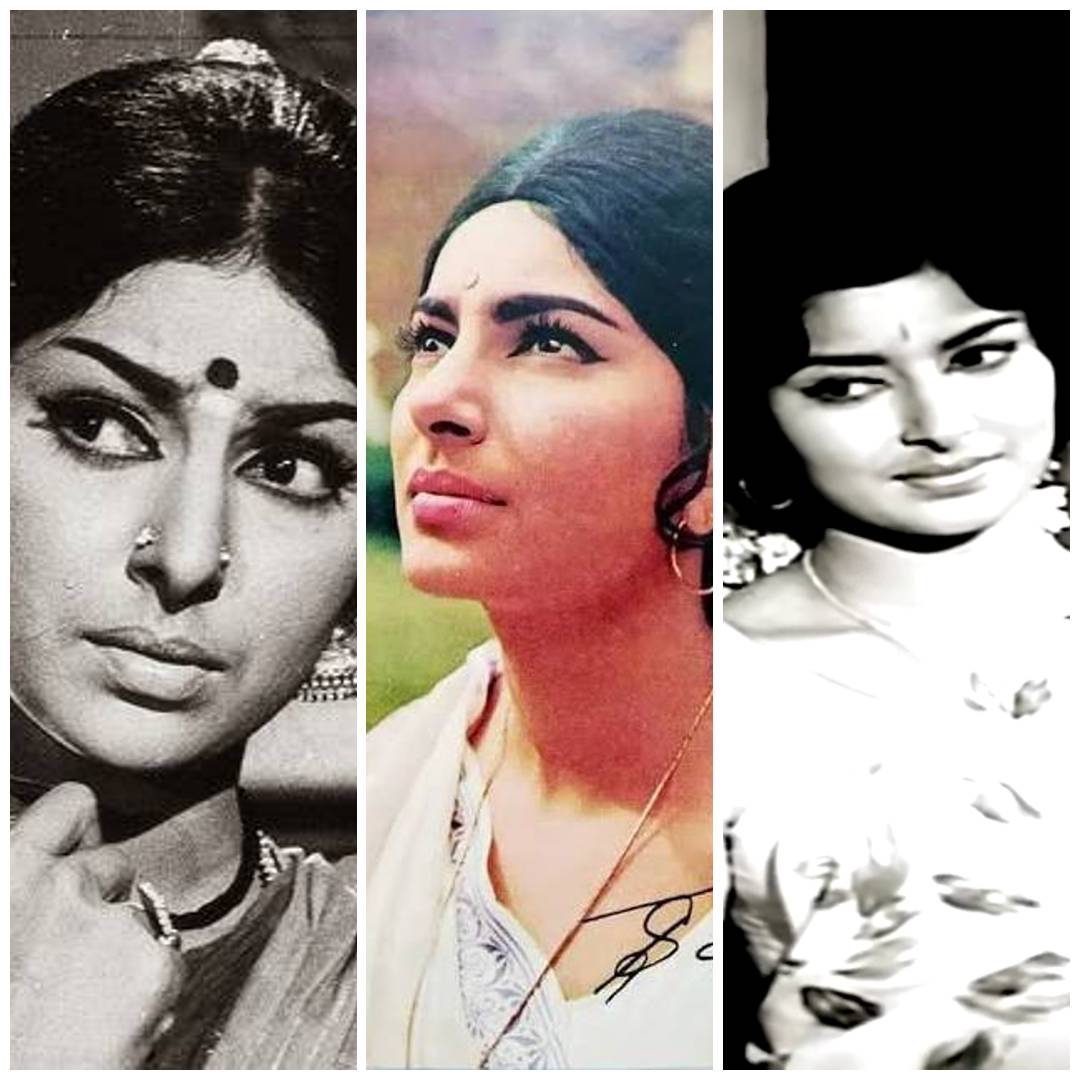
As a child, I enjoyed watching her films, the majority of which were sentimental, until she abruptly shifted to portraying ferocious characters. Then she became an M.P., an industrialist, and suddenly she was not in the news for many years. Then, she embarked on her third chapter in Telugu cinema with the release of Sankraanti. Here are the excerpts from the exclusive interview with veteran actress Sarada, popularly known as Urvashi Sarada.
(NOTE: We conducted this interview in 2005. We are reproducing it with some minor changes and edits.)
Sri: Did you start your career as a child artist with “Bhakta Potana”? Or was it ‘Kanyasulkam’? What struggle did you undergo to become an actress, and what made you a strong person?
Sarada: My debut film was ‘Kanyasulkam’ (1955). I played a minor role in the film. After that, I appeared in some stage plays in Madras and also had small roles in other language films. There was not much struggle, but yes, there was a gap in the films.
From 1961 to 1965, I played comedy roles in films such as Aatma Bandhuvu (1962), Tobuttuvulu (1963), and Murali Krishna (1964), among others. Then, we shifted to Kerala, and I started getting good roles in Malayalam movies. When ‘Swayamvaram’ (1972 Malayalam film) became a hit and I received the National Award for my role, Gemini Studios approached me to remake it in Telugu. I performed the same role in four different languages. The Telugu and Hindi versions were also huge hits.
Sri: I believe “Manushulu Maaraali” brought you the image of a “weeping girl’ on screen.
Sarada: Indeed, I received two additional Urvashi awards, one in Malayalam for ‘Tulabharam’ and another in Telugu for ‘Nimajjanam.’ Following these films in Telugu, I was able to secure more serious roles compared to other leading ladies of the era. Most of the roles offered to me were of a sorrowful nature.
Sri: You’re more into serious cinema at that time than the regular hero-/heroine-oriented films.

Sarada: As you are aware, our film industry tends to stereotype actors based on their past roles. At first, people labeled me as a comedic artist, but I gradually evolved into a serious artist. The filmmakers were hesitant to take any risks due to the significant financial stakes involved and offered me the same kind of roles for a long time.
Sri: With the release of ‘Chandasaasanudu’, you embarked on your second career in Telugu films, albeit with occasional appearances. Why did this gap happen?
Sarada: The gap occurred because I was doing films in other languages. Additionally, I did not receive any favorable offers in Telugu during that period.
Sri: How was your second innings?
Sarada: My second innings in Telugu films were good. To tell you frankly, I was happier in my second inning than in my first inning because I had scope for a lot more variety in the second. I thoroughly enjoyed my films like Pratidhwani, Chandasaasanudu, Anasuyamma Gaari Alludu, Jagannaatakam, etc. These films, as I mentioned earlier, were characterized by their variety. I was not really happy doing all those weeping roles in Telugu before because I acted in so many good roles in Malayalam.
At the age of 22, I played the role of a mother to four children in Malayalam. In Telugu, I primarily portrayed characters that were by and large the same.
Sri: However, you also acted in excellent Telugu films such as Kaalam Maarindi, Sarada, Swathi, and Nyaayam Kaavaali.
Sarada: The films ‘Sarada’ and ‘Kaalam Maarindi’ are part of my initial phase of career. Despite their high quality and my personal admiration for them, these films elicit a sentiment that resonates with women’s fans. Roles such as ‘Swathi’ and ‘Nyaayam Kaavaali’ are beneficial for society, as they highlight the need for change and the importance of fighting for justice. Of course, I also received the national award for a Telugu film, Nimajjanam, but such films came my way very rarely.
Sri: Why is there a gap of seven to eight years between your first and third innings? What were you doing at this time?
Sarada: I stepped into political arena then. My involvement in politics was a mistake. I wanted to do a lot for people, but they didn’t allow me to do it there. The lack of support from the politicians was extremely frustrating.

Sri: Why did you lose the elections in the second term?
Sarada: Upon my first election as M.P., I set out to accomplish a multitude of goals, but other politicians consistently sought their own agenda. They treat politics like any other business, which is not my intention! I want to do something for society. I completed all the tasks I could within the short timeframe, securing approval for the railway in our area as well as for roads and schools in my constituency. However, my frustration with the politicians was palpable. I spent the majority of my money on personally taking on and completing the challenges.
Sri: You’ve been in the film industry for more than five decades! After achieving numerous successful roles in the film industry, what motivated you to enter the business world? Why did you start Lotus Chocolates?
Sarada: We initially started Lotus Chocolates to create jobs for urban ladies. Although it was initially successful, I was never involved in its day-to-day operations. I was only the founder. The factory also raised a public issue. When someone else bought the factory and then sold it to another party, the factory suffered losses.
Sri: I think you produced some films in Telugu, too.
Sarada: Yes, I have financed several films in Telugu and have also produced one or two in Tamil.
Sri: Tamil? Which film?
Sarada: Urvashi.
Sri: Working in multiple languages and interacting with a diverse range of people, you occasionally take on the role of a mother to stars who are significantly older than you. You also portrayed the role of Dharmendra’s mother in a Hindi film, despite Dharmendra being significantly older than you. This is in addition to NTR’s dual roles in films such as Sardaar Paapaaraayudu and Chandasaasanudu.
Sarada: (laughs) It’s a part of the job. Sometimes, even I felt embarrassed to apply white paint to my hair to look older. The Dharmendra film you are referring to is a remake of ‘Pulibidda’ in Telugu. After I completed the Telugu version, they asked me to work on the Hindi version.
Sri: You contributed to the Hindi version of Manushulu Maaraali, which was also your first Hindi film, correct?
Sarada: The 1970 film “Samaj Ko Badal Dalo” (remake of Malayalam film ‘Thulabharam’) was a big hit in Hindi, too. The Telugu film “Manushulu Marali” was itself remake of ‘Thulabharam’.
Later, I worked on “Mehendi Rang Laayegi,” which is the Hindi version of “Gorintaaku.” Yes, I have worked on a few Hindi films in the interim, but I don’t remember them and didn’t spend much time in Bollywood.

Sri: You have received three Urvashi (national) awards, along with numerous state awards and other accolades. You saw a lot of life. Why did you make the same mistakes as others in your marriage?
Sarada: (Pause) When I was first married, I was only 22. Up until that point, my knowledge was limited. My father was very strict and protective toward me. Therefore, I had limited exposure to the outside world. I fell in love with Chalam (the actor), who was already married with three kids and was a widower at that time. People did warn me against him, but love was so blind that I married him. After the third day of our marriage, he revealed his true nature.
Sri: I’ve heard that he used to arrive on sets with a hangover and that he also physically assaulted you during the Premalu-Pellillu shoot.
Sarada: He never manhandled me on the sets, but a couple of times he raised his hand at home. Anyway, that person is no more.
Sri: Another rumor was that the marriage was a contract marriage…
Sarada: No, it was not a contract marriage. Following my divorce, my focus shifted to the film industry. In 1975, I married a well-educated Malayali who hailed from a wealthy family. I was pleased for some time. But later, I realized that he was only interested in my money and nothing else. So, we parted after some time. He was the one who convinced me to invest in the chocolate factory.
Please note that I am childless and raised my niece and nephew as my own. I am pleased that they have settled well now.
Interviewed by Sri Atluri
Edited by: Nachaki and Sumana Vishwanath






